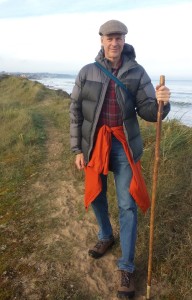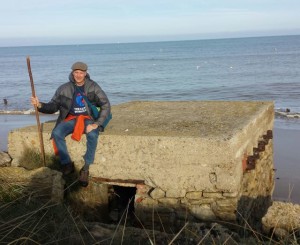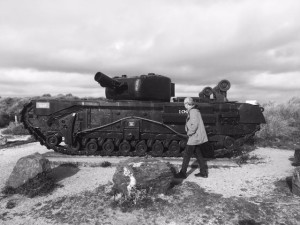Thursday, November 12, 2015 – Asnelles to Lion sur Mer
Yeah! No narrow roads or scary traffic today! Our 13-mile walk unfolds along the beautiful beaches of Normandy. Steve and I could not ask for a more perfect route. Our path meanders just above the strand, sometimes on man-made boardwalks, sometimes on trails that weave through dunes lush with plant and animal life.
The surf and light breeze are rhythmic, soothing, hypnotic. Large tracts of seaweed have been left behind by the tide. The locals comb through them for mussels, clams, perhaps other shellfish.
Shorebirds are in abundance. And rabbits! Hundreds of rabbits have carved out a sprawling colony in the soft soil on the edge of the dunes, not coincidentally, next to a veritable smorgasbord of grass.
I enjoy the plant life as well – both with my eyes and tongue. Although I feasted on three excellent meals today, I eagerly snack on plump rose hips.
But this natural beauty is frequently interrupted by reminders of the traumatic events of June 6th, 1944. We walk by several pill boxes, concrete bunkers from which German troops rained fire on Allied soldiers and ships. We learn that one pill box sunk five Allied vessels, killing everyone on board, until it was “cleared.” (From a German soldier’s point of view, “cleared” is a euphemism for “killed.”)
We also pass many monuments, tributes to those who fought and died. Occasionally, a tank serves as a monument. A Canadian tank called “1 Charlie” made it to shore on D-Day, only to be disabled by German soldiers, the tank’s occupants “cleared.”
Throughout the day, I ponder the tremendous sacrifices made by so many people – not just the soldiers or the residents of the French communities in the line of fire, but the everyday men and women back home. I think about my Dad, who did his part for the war effort collecting tinfoil for the scrap metal drives. I think about “Rosie the Riveter,” and all who helped transform the American economy to fight a crisis that seemed both urgent and intractable.
I thought about how the same commitment, focus and national sense of purpose, is again demanded in the face of the escalating climate crisis. If 70 years ago, America could mount an economic conversion that led to the successful invasion of Normandy and the liberation of Europe, certainly America could rise to the challenge again and transform the world’s largest economy for a peaceful purpose.
Of course, it’s not just America, but all the nations of the world that need to embrace this level of commitment and determination. And it is not war that we must mobilize against, but an enemy designed and built with our own hands.
The upcoming summit in Paris sits at the crux of the potential success or failure of this economic and societal transformation. I remain cautiously optimistic that humanity can pull together to fight this crisis.
A sign of hope appears along the road. Not far from the American cemetery is a German cemetery. Remarkable! The French allow a memorial to the country that invaded, killed and occupied them. That strikes me as a tremendous gesture of forgiveness and goodwill.
If the world can tolerate a German cemetery next to an American cemetery on French soil, perhaps the world is poised to move beyond division, beyond war, beyond greed, toward the cooperation needed to build a sustainable future for the betterment of all.





HI, Ed… I was born on June 6, 1944 in Washington, D.C., far from the shores of Normandy. Each year I’m reminded of D.Day on my birthday. I’m following the walk to Paris with you now, seeing with your eyes the beach and the sacrifices that took place there even as I was coming into the world. In this Walk 2 post, you speak of the German cemetery on French soil, a French gesture of such grace and fortitude…. and of the commitment our own soldiers made on that day. I agree with you that the same levels of commitment and courage are sorely needed in 2015, when climate change threatens to destroy the sustainability of earth for our children and grandchildren. This afternoon I listened to a nationwide conference call that NRDC had set up. During the Q&A which followed the presentation a man from CA remarked that the term “environmental catastrophe” should replace “climate change”, indicating more vividly the seriousness of the situation in 2015…Paris is coming: it will be a starting point for the continuous work that faces us all in the months and years ahead.
Hi Carolyn, and sorry I am just seeing this now. I’m not accustomed to reviewing comments on my website. I’ll have to get better at that. Really appreciate your reflection on my walk, climate, WW II. Thanks – Ed